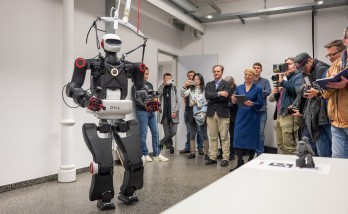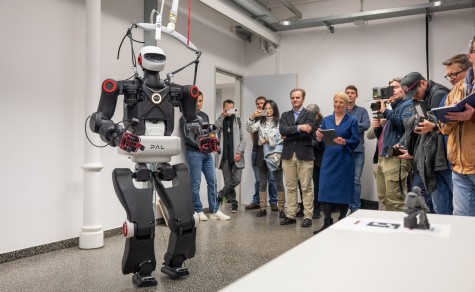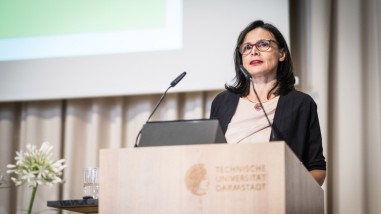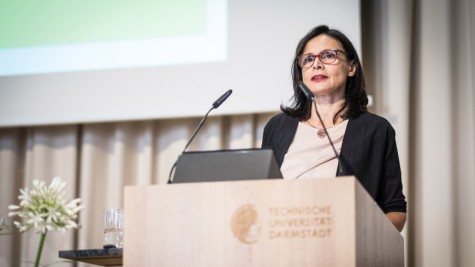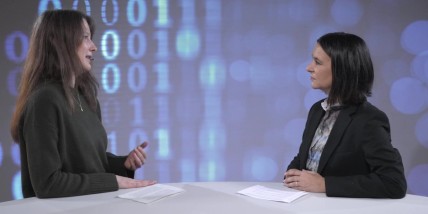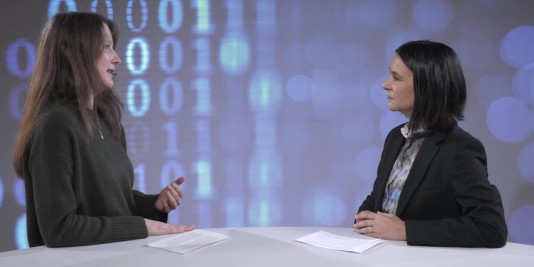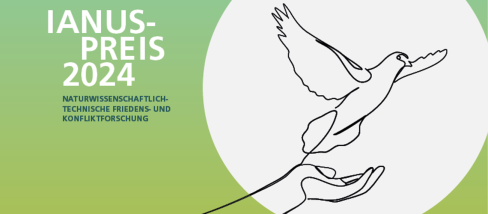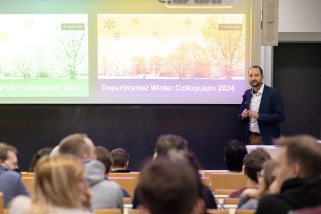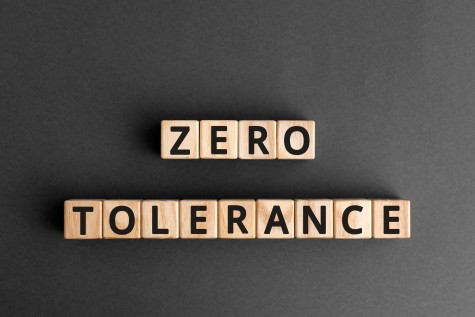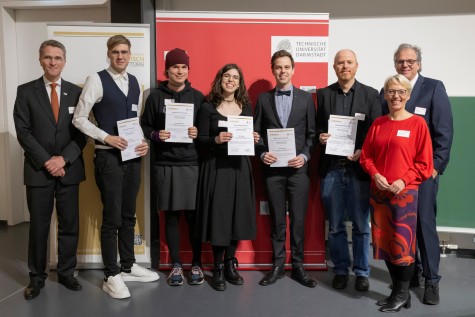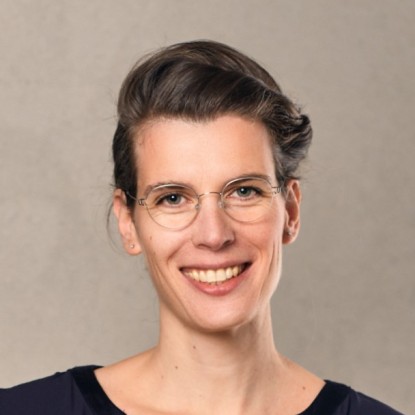-
![]() Picture: Simona Kehl
Picture: Simona Kehl![]() Picture: Simona Kehl
Picture: Simona KehlNew long-term guest at the Department: Prof. Isabella Graßl
2025/03/11
First Gender Mint Professorship for Computer Science
From March, we will welcome Dr. Isabella Graßl as our first Gender MINT Visiting Professor of Computer Science for two years. In her background and research, she combines computer science and the humanities: she holds Bachelor's degrees in Internet Computing and in Linguistics and Textual Studies, as well as Master's degrees in Computer Science and in Textual and Cultural Semiotics from the University of Passau. She completed her doctorate there with a thesis on diversity in programming education. The 32-year-old brings international research experience from the University of Cambridge, where she was most recently a Research Associate in Computing Education. The visiting professorship is based in the Software Engineering Research Group of Prof. Mira Mezini. It is funded by the German Federal and State Government's Women's Professorship Programme III in the first year and by the Department itself in the second year. To get to know her better, we asked her a few questions
-
![]() Picture: fidaolga - stock.adobe.com
Picture: fidaolga - stock.adobe.com![]() Picture: fidaolga - stock.adobe.com
Picture: fidaolga - stock.adobe.comNew in the Office of Student Affairs: Alessandra Nesensohn
2025/02/28
Examination manager for the Master's degree programmes
Since January, Alessandra Nesensohn has been supporting the Office of Student Affairs as the new Examinations Manager. She previously worked in the Department of History and Social Sciences. We wish her a good start and asked her a few questions to get to know her better.
-
![]() Picture: Patrick Bal
Picture: Patrick Bal![]() Picture: Patrick Bal
Picture: Patrick BalExtraordinary employee
2025/02/28
Humanoid robot TALOS at TU Darmstadt for research into human-like learning
The Technical University of Darmstadt is expanding its portfolio of large-scale interdisciplinary research equipment with a special addition: the state-of-the-art humanoid robot ‘TALOS’. There are currently only five other research centres in the world with such a robot, and Darmstadt's TALOS is the only one in Germany. Its arrival today also marked the launch of the new Laboratory for Humanoid Robotics.
-
![]()
![]()
New at the Department: Professor Simone Schaub-Meyer
2025/02/26
Image and Video Analysis
Simone Schaub-Meyer has been Professor of Image and Video Analysis at the Department of Computer Science since February. The 35-year-old scientist completed her doctorate at ETH Zurich, and in her dissertation, which was awarded the ETH Medal, she developed innovative methods for motion visualisation and video image interpolation.
-
![]()
![]()
Female Student Travel Award 2025
2025/02/11
Apply by 5 March 2025
CROSSING, emergenCITY, the cluster project The Third Wave of AI (3AI), and the Zuse School ELIZA recognize exceptionally well performances of female students.
-
![]()
![]()
Computer science professor Mezini honoured as ACM Fellow
2025/01/30
Professor Mira Mezini, Head of the Research Group Software Engineering, has been appointed as an ACM Fellow at the Department of Computer Science at TU Darmstadt.
-
![]() Picture: Paul Glogowski
Picture: Paul Glogowski![]() Picture: Paul Glogowski
Picture: Paul GlogowskiNew at the Department: Professor Naser Damer
2025/01/23
Biometrics, Human Analysis and Behavior Understanding (BHABU)
Naser Damer has been a professor at TU Darmstadt since the beginning of January. He has taken over the newly created professorship for ‘Biometrics, Human Analysis and Behaviour Understanding (BHABU)’ at the Department of Computer Science, where he will strengthen the work of the National Research Centre for Applied Cybersecurity ATHENE.
-
![]() Picture: Merck KGaA/Bernd Roselieb
Picture: Merck KGaA/Bernd Roselieb![]() Picture: Merck KGaA/Bernd Roselieb
Picture: Merck KGaA/Bernd Roselieb“My studies were very interdisciplinary”
2025/01/20
The expertise that computer science alumnus Kai Beckmann acquired and the people he met at TU Darmstadt provided him with important stimulus and inspiration for his professional career at Merck
Kai Beckmann studied computer science at TU Darmstadt in the 1980s and completed his doctorate in economics at the university ten years later part-time while working. Beckmann began his career at the science and technology company Merck as an IT system consultant. Today, the alumnus is a Member of the Executive Board of Merck responsible for the Electronics business sector (semiconductors and specialty chemicals), the Darmstadt site, patents and inhouse consulting.
-
![Screenshot Interview mit Simone Schaub-Meyer]()
![Screenshot Interview mit Simone Schaub-Meyer]()
Understanding what AI models can – and can't – do
2024/12/23
Interview with Dr. Simone Schaub-Meyer, early career researcher in the cluster project “RAI”
In the “RAI” project, Dr. Simone Schaub-Meyer is working to improve our understanding of widely used artificial intelligence (AI) models and to make them more robust. In this interview, the computer scientist reveals why this is important, who could benefit from it in the future and what drives her personally. Part two of a video series with early career researchers in the planned clusters of excellence involving TU Darmstadt.
-
![Portrait von Iryna Gurevych, Informatikprofessorin an der TU Darmstadt]() Picture: Rüdiger Dunker
Picture: Rüdiger Dunker![Portrait von Iryna Gurevych, Informatikprofessorin an der TU Darmstadt]() Picture: Rüdiger Dunker
Picture: Rüdiger DunkerProf Iryna Gurevych among the ‘Top 100 most influential women in German business’
2024/12/17
manager magazin and BCG honour their formative influence
Professor Dr Iryna Gurevych, Head of the Ubiquitous Knowledge Processing (UKP) Lab at the Technical University of Darmstadt, has been named one of the ‘Top 100 most influential women in German business’ by manager magazin and the Boston Consulting Group (BCG).
-
![]()
![]()
Award of the IANUS Prizes for Peace and Conflict Research
2024/12/12
The winners of the IANUS Prize 2024 were honoured at the TU Darmstadt. The prize was awarded to four outstanding diploma theses on topics of scientific-technical peace and conflict research. The award winners come from various disciplines at TU Darmstadt.
-
![Übergabe des Förderbescheids in Wiesbaden: (v.l.n.r.) Wissenschaftsminister Timon Gremmels, Kristian Kersting (Co-Direktor von hessian.AI), Prof. Dr. Tanja Brühl (Präsidentin der TU Darmstadt) und Hessens Digitalministerin Prof. Dr. Kristina Sinemus.]() Picture: HMWK
Picture: HMWK![Übergabe des Förderbescheids in Wiesbaden: (v.l.n.r.) Wissenschaftsminister Timon Gremmels, Kristian Kersting (Co-Direktor von hessian.AI), Prof. Dr. Tanja Brühl (Präsidentin der TU Darmstadt) und Hessens Digitalministerin Prof. Dr. Kristina Sinemus.]() Picture: HMWK
Picture: HMWK12 Million Euros for AI Center hessian.AI
2024/12/11
Center combines the competence and expertise of 13 universities
Hesse supports the exploration of artificial intelligence as a field of the future: Science Minister Timon Gremmels, together with Digital Minister Prof. Dr. Kristina Sinemus, handed over a funding notice worth twelve million euros to hessian.AI, the Hessian Center for Artificial Intelligence, at the Hessian Ministry of Science, Research, Art, and Culture. Discussions also focused on current and future developments of the center. hessian.AI combines the competence and expertise of 13 universities and, with its scientific excellence, is a key component of the hessian.AI ecosystem.
-
![]() Picture: Anne Grauenhorst
Picture: Anne Grauenhorst![]() Picture: Anne Grauenhorst
Picture: Anne GrauenhorstWinter colloquium of the department
2024/12/06
News from the field and opportunity to exchange ideas
A light snow fell just in time for the start of this year's Departmental Winter Colloquium. In a cosy atmosphere, staff, students, professors and emeriti could once again look forward to an update on the Department, short presentations by new researchers and the presentation of the Feedback Awards by the Student Committee
-
![]() Picture: SecondSide - stock.adobe.com
Picture: SecondSide - stock.adobe.com![]() Picture: SecondSide - stock.adobe.com
Picture: SecondSide - stock.adobe.comIncidents of harassment on campus
2024/11/27
Current information
In the last few days, there has been harassment of students and stalking both online and on campus. We are shocked by this behavior and there will be no tolerance for this behavior at our department and the entire university!
-
![]() Picture: Klaus Mai
Picture: Klaus Mai![]() Picture: Klaus Mai
Picture: Klaus MaiTU presents Athene Awards for Good Teaching
2024/11/21
The Departmental Award goes to the ENCRYPTO group for the restructuring of the Digital Technology course.
On Wednesday, 20 November 2024, TU Darmstadt once again hosted its annual Teaching Day, which focuses on current issues and challenges in studying and teaching. The day concluded with the presentation of the Athene Awards for Good Teaching, donated by the Carlo and Karin Giersch Foundation. With total prize money of 46,000 euros, the Athene Awards honour outstanding achievements in teaching. This year, the great commitment of the ENCRYPTO group, led by Prof. Thomas Schneider, was rewarded with the Athene Departmental Prize Computer Science. The prize of 2,000 euros is in recognition of the restructuring of the first semester course 'Digital Technology', which the lecturers have consistently adapted to the needs and feedback of the students.
Computer Science
News
Archive





